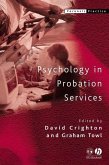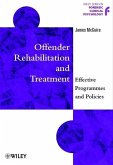Dieser Download kann aus rechtlichen Gründen nur mit Rechnungsadresse in A, B, BG, CY, CZ, D, DK, EW, E, FIN, F, GR, HR, H, IRL, I, LT, L, LR, M, NL, PL, P, R, S, SLO, SK ausgeliefert werden.
"Psychological Research in Prisons contains somenew and interesting empirical results. But its main achievement isto put the question mark firmly back into 'What works?'Early chapters explore how, often tentative, research findingsabout interventions which might reduce reoffending have becometranslated into overly prescriptive policies that actually serve toundermine rather than foster effective practice. This is a book bypsychologists but its readership should be much wider -policy makers, prison governors, probation and prison staff, andcriminologists will all find much food for thought within itspages." Professor Carol Hedderman, University ofLeicester
"It is sure to become a new standard reference book inthis field. It will be a very useful aid to the work ofpsychologists in Japan, who are currently introducing CBT withincustodial settings." Hiroshi Urata, Senior Psychologist,Wakayama Juvenile Classification Home, Japan









